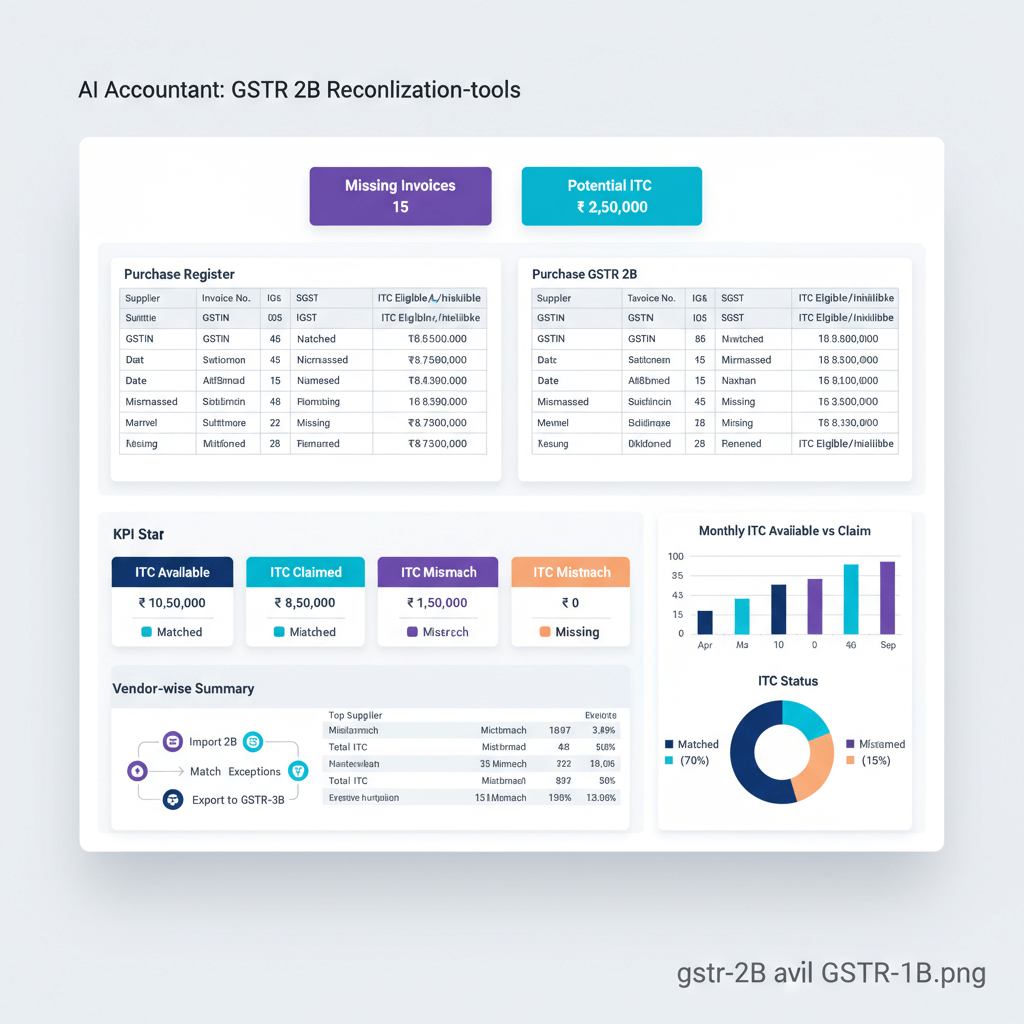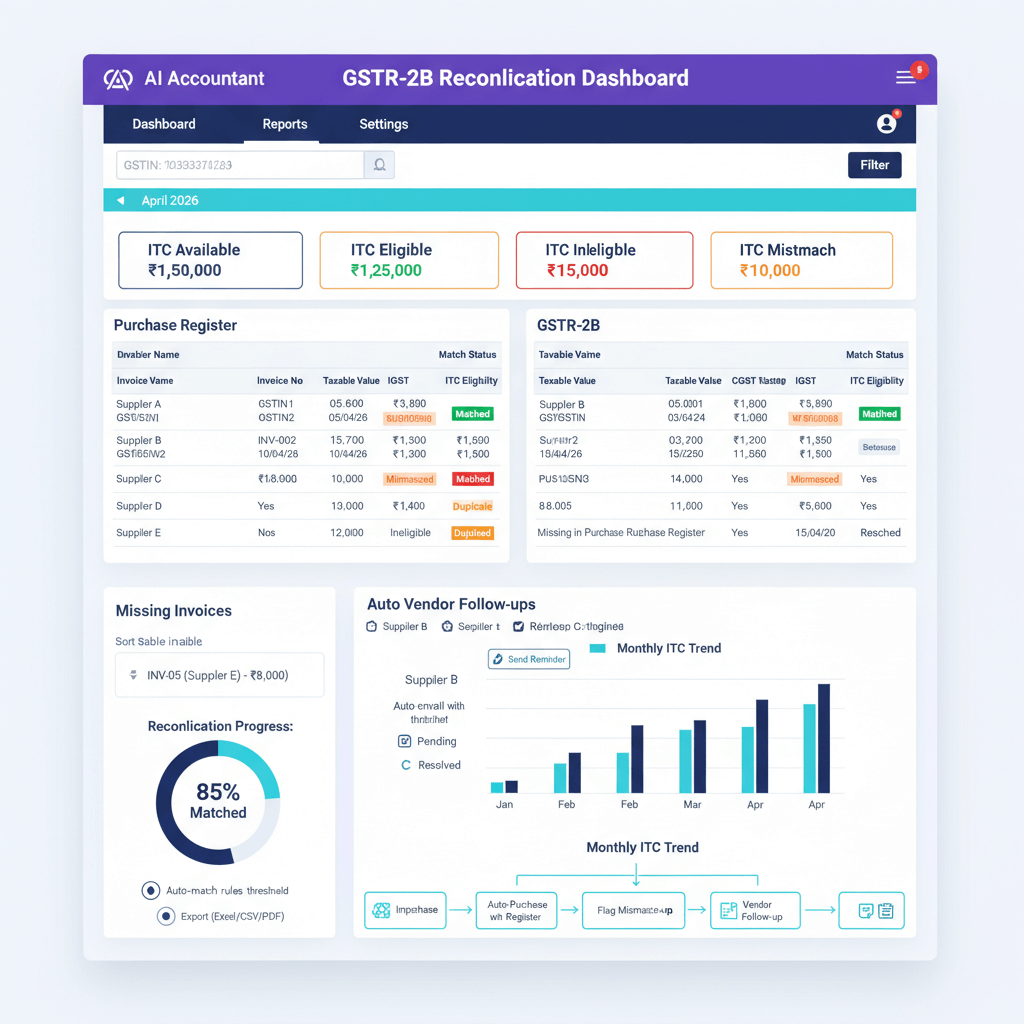Key Takeaways
- Automation of bookkeeping, reconciliation, and expense management transforms manual workflows.
- Real-time reconciliation ensures financial data is always current.
- Predictive analytics delivers accurate cash flow forecasting and scenario planning.
- Seamless integrations sync data across accounting platforms, CRM, and payment systems.
- AI-driven fraud detection enhances security and compliance.
- Successful adoption relies on a clear migration plan, effective workflows, and team training.
Introduction to AI Accounting Software in 2025
The world of accounting is changing fast. Gone are the days when accountants spent endless hours manually entering data, chasing bank reconciliations, and preparing reports that were outdated before the ink dried. AI accounting software has emerged as the game changer that’s reshaping how businesses handle their financial operations.
Gone are the late nights spent cross-checking entries or hunting for missing invoices. AI tools turn financial chaos into organized, audit ready perfection.
Think about your last month-end closing. How many late nights did you spend matching entries? If you’re nodding, you’re not alone.
What Makes AI Accounting Software Different from Traditional Tools
Traditional accounting software requires you to do most of the thinking—you input data, categorize transactions, and create reports manually. AI accounting software flips this model: the system learns from your data, recognizes patterns, predicts account codes, and flags unusual activities for review.
This isn’t just about speed; it’s about accuracy and intelligence that improves over time using machine learning, natural language processing, and predictive analytics.
Core Capabilities of Modern AI Accounting Software
Automated Bookkeeping That Actually Works
The backbone of AI accounting is its ability to take raw financial data from various sources and transform it into properly categorized, ledger ready entries.
- Document ingestion from PDFs, CSV files, Excel spreadsheets, and scanned images.
- Automatic data extraction and categorization using OCR and learning algorithms.
- Contextual suggestions for complex transactions, with flags for review when needed.
Get started with a guide to document processing in banking: bank statement OCR tool guide.
Real-Time Reconciliation
Instead of a monthly task, AI accounting software automates bank reconciliation continuously, matching transactions as they occur and highlighting discrepancies instantly.
Learn how AI reconciliation is fixing the biggest headache in Indian accounting and explore best practices: bank reconciliation automation.
Intelligent Expense Management
Expense management becomes effortless when AI reads receipts, extracts key information, and applies correct account codes and tax treatments automatically.
Discover how AI handles compliance and expense automation: AI in accounting.
Advanced Features That Set Leading Platforms Apart
Predictive Analytics in Accounting
AI accounting software doesn’t just record what happened; it uses historical data to forecast cash flow, identify seasonal trends, and suggest optimal payment timing.
See how cash flow forecasting works: cash-flow-forecasting and scenario planning: scenario planning.
AI Fraud Detection and Security
AI monitors baseline patterns for normal activity and flags deviations that might indicate fraud, duplicate payments, or policy violations.
Learn about SOC 2 Type II security: AI Accountant is now SOC 2 Type II certified.
Seamless Integration Capabilities
Leading platforms sync bi directionally with CRM, banking systems, payment processors, and more, ensuring data consistency across your tech stack.
Explore the field impact of AI integrations: AI in accounting field impact.
Compliance and Audit Ready Processes
Maintaining Regulatory Compliance
AI accounting software handles complex frameworks automatically, from GST reconciliation to TDS calculations, while keeping audit trails intact.
Read about GST reconciliation automation.
Preparing for External Audits
Audit trails, linked supporting documents, and standardized reporting formats make external audits faster and less painful.
Benefits for Different Types of Users
Empowering Chartered Accountants
AI software eliminates routine bookkeeping, enabling CAs to onboard clients faster, scale operations, and focus on advisory services.
Learn how CAs can scale: scale CA firm with AI tools and streamline onboarding: client onboarding automation.
Supporting CFOs and Finance Teams
Real-time dashboards, automatic variance analysis, and scenario modelling help CFOs make strategic decisions swiftly.
Check out financial dashboard solutions: financial dashboard software.
Helping Business Founders Stay Informed
Founders get clear business metrics without deep accounting knowledge, enabling faster decisions on pricing, investments, and growth.
Discover CEO dashboards: CEO dashboard accounting insights.
Implementation Best Practices
Planning Your Migration Strategy
Document current processes, plan data mapping, clean historical records, and run old and new systems in parallel during transition.
Setting Up Effective Workflows
Define approval processes, exception handling, and integration sequencing to leverage AI recommendations while maintaining oversight.
Training Teams for Success
Focus training on interpreting AI suggestions, change management support, and continuous learning to ensure adoption and trust.
Choosing the Right AI Accounting Software
Evaluate platforms based on core features, integration capabilities, security certifications, industry fit, and vendor support. Consider free trials and demos to validate performance against your specific needs.
Future Trends in AI Accounting Software
The future of accounting is intelligent, automated, and strategic. Autonomous agents and advanced NLP will continue to push boundaries.
Read about the evolution of AI in accounting.
FAQ
How does AI accounting software automate bank reconciliations?
AI software uses pattern recognition and transaction matching algorithms to reconcile bank entries in real time, flag discrepancies for review, and update ledgers automatically, eliminating manual matching.
Can AI accounting tools handle GST compliance in India?
Yes, leading AI accountants apply correct GST codes and rates automatically, generate reconciliation reports, and maintain audit trails to support seamless filing.
How accurate are cash flow forecasts generated by AI Accountant?
AI Accountant analyzes historical patterns, seasonal trends, and customer behavior to deliver forecasts with up to 95% accuracy, allowing better planning.
What’s the best practice for migrating historical data to AI accounting platforms?
Map existing charts of accounts, clean and standardize transaction data, perform test imports, and run parallel processes until you validate AI suggestions.
How does AI fraud detection work in accounting software?
The system establishes baseline transaction patterns, continuously monitors deviations, detects duplicate payments, and flags unusual vendor or expense activity.
Can my CA firm scale using AI accounting software like AI Accountant?
Absolutely. AI Accountant automates routine tasks, accelerates client onboarding, and frees your team to focus on advisory services, enabling you to serve more clients with the same resources.
How do I train my team to adopt AI accounting workflows effectively?
Provide hands-on sessions, emphasize interpreting AI recommendations, set clear escalation paths for exceptions, and offer continuous learning resources.
What security standards should I look for in AI accounting solutions?
Look for SOC 2 Type II, ISO 27001 certifications, data encryption at rest and in transit, and regular third-party security audits.
How do real-time dashboards in AI accounting help CFOs in decision making?
Real-time dashboards provide up-to-date insights on cash positions, budget variances, and key performance indicators, enabling agile strategic decisions.
Is it possible to customize AI accounting software to industry specific needs?
Yes, many platforms offer API connectivity and configurable rulesets to tailor workflows, approvals, and reporting for niche industries or unique business models.
-01%201.svg)





